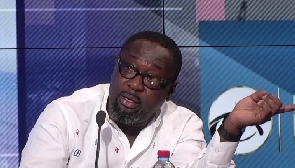 President GIFF, Eddie Akrong speaking on Eye on Port
President GIFF, Eddie Akrong speaking on Eye on Port
President of the Ghana Institute of Freight Forwarders (GIFF), Mr. Eddie Akrong has vowed on behalf of freight forwarders and importers not to pay the excessive charges that have been slapped by shipping lines.
According to the President of GIFF, Mr. Eddie Akrong, who was speaking on Eye on Port, many of the fees charged importers by the shipping lines are unjustifiable and outrageously high.
“They are charging for unstuffing which they are not doing. They are even charging for ISPS charges and container returning fees which I do not understand,” Mr. Akrong bemoaned.
He explained that the basis for which the shipping lines have added on to their fees which have to do with the Ghana Ports and Harbours Authority increasing their Port charges to the shipping lines is untenable.
Mr. Eddie Akrong thus said that it is unfair for the lines to pass on those charges when they do not offer those services.
He said whereas the Port Authority has increased its tariffs to the shipping lines by a cumulative amount of USD 35, the shipping lines on the other hand have increased their charges by USD100 and in some cases more.
According to the President of GIFF such unjustifiable charges have been going on for far too long and it is about time the Minister of Transport intervenes.
He said his outfit has written to the Minister to sit with the various industry players to see to it that certain shipping line charges are scrapped.
Mr. Akrong also complained about the fact that shipping lines did not engage them to negotiate the increment in charges as the Ghana Ports and Harbours Authority did when it planned to revise its port tariffs to the lines.
The shipping lines were criticized for making commercial decisions without recourse to the importing public which is detrimental to the cost of doing business in Ghana.
Also speaking on the same subject, the Ghana Ports and Harbours Authority represented by the General Manager in charge of Marketing and Corporate Affairs, Mrs. Esther Gyebi-Donkor revealed that the Port Authority made a limited increment on the container tariffs based on some operational investments that have been made to improve port efficiency and productivity.
GPHA has adjusted the tariff to help cover cost of developing, operating and maintaining the ports.
According to her, since July 2020, this has been justified, widely communicated, analyzed and accepted as reasonable. The bone of contention was whether shipping lines should pass on all the limited increments to shippers and also if the shipping lines should adjust their freight to reflect the increases and collect at origin rather than introduce a stand alone charge “Port Additional Charge” and collect it locally. There is a general feeling from stakeholders that the Shipping Lines should incorporate it into the freight.
She said the expectation was not for the shipping lines to pass on the entire cost unto importers and explained that although she acknowledged that the shipping line should cover both the inbound (import) and outbound (export) cost, all the export costs should not be additionally charged to the importers. Mrs Gyebi Donkor said that there is some quantity of full load containers (all are not empty) that are also shipped from the ports of Ghana for which the exporter pays. She also averred to the fact that the ships calling the Port of Tema may achieve an overall saving because the ships spend less time in port.
“In 2019, at the MPS Terminal 3, the average turnaround time was 3 days 7 hours per vessel, as compared to 2020, which was 2 Days and 5 hours. Delays to vessels in Port adds to cost, so alternatively with this improvement, we expect the quick turnaround time to lead to lower fright rates.”
Further emphasizing the benefits of the Ports investment in infrastructure, superstructure, Equipment, Technology, and personnel, she indicated that despite the COVID19 pandemic, the Port of Tema posted healthy traffic increases in both imports and exports.
“Container traffic for the Port of Tema in 2020 exceeded the 2019 figures by 19.84% whilst it exceeded the 2020 target by 23.07%.”
Mrs Gyebi-Donkor also shared a strong view that even though she is not privy to the factors that went into the decision to charge the increase in port charges locally, she is of the view that most of the container vessels calling the Ghanaian ports are Liners. In Liner terms, freight usually includes the cost of loading onto and discharging from the vessel. Port service charges are therefore one of the main factors affecting freight rates internationally.
She therefore expects the lines to incorporate it in their freight rates so that the full complement of the freight information will be available to the importer for deciding which shipping line to select from origin and not to charge it in Ghana as a port additional charge.
Taking his turn on the subject, an Executive Member of the Ship Owners and Agents Association of Ghana, Adam Imoro Ayarna, contended that it is common business practice to pass on any operational cost to shippers. He said importers and exporters have the right to negotiate with shipping lines on the charges.
However, the GIFF President, Mr. Eddy Akrong said the complaints of importers are usually not regarded by the shipping lines.